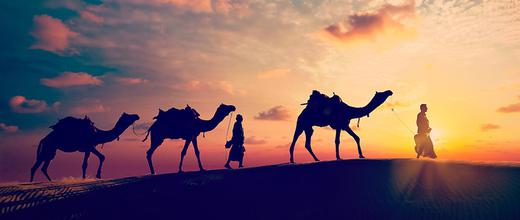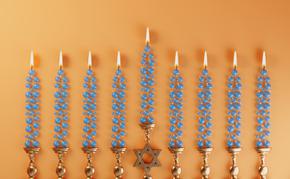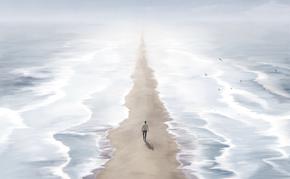The views expressed in our content reflect individual perspectives and do not represent the authoritative views of the Baha'i Faith.
The Baha’i teachings on unity in diversity attach great importance to the indigenous peoples of the world.
I write this essay in testimony to that kindred spirit, where recently I hiked part of the South Sinai trail of Egypt, the desert home of five Bedouin tribes. The trip gave me a glimpse into an indigenous culture and way of life—a life lived close to God. In fact, the Bedouin have a saying, that “when people come to the mountain we become who we are.”
In 1916, Abdu’l-Baha also wrote about the ancient inhabitants of the Arabian Peninsula, comparing that tribal culture to the indigenous tribal peoples of America:
Attach great importance to the indigenous population of America. For these souls may be likened unto the ancient inhabitants of the Arabian Peninsula …. When the light of Muhammad shone forth in their midst … they became so radiant as to illumine the world. Likewise, these Indians, should they be educated and guided, there can be no doubt that they will become so illumined as to enlighten the whole world. – Abdu’l-Baha, Tablets of the Divine Plan, p. 33.
I hiked the trail with a group of friends and Bedouin guides who became friends. As empty swaths of sand stretched out beneath our feet and a vast sky above dwarfed us in scale, so did the constructions of our day-to-day titles, possessions and privileges fade into obscurity. Unplugged and essentially unreachable, the desert offered us a backdrop to contemplate the hectic lives we urban dwellers often seek relief from, and I found myself wondering: what is true civilization?
The teachings of the prophets give us an answer about where to find it. Abdu’l-Baha referred to both Christian and Muslim scripture as he explained:
In short, O ye believers of God! Exalt your effort and magnify your aims. His Holiness Christ says: Blessed are the poor, for theirs shall be the Kingdom of Heaven. (Mathew 5:3) In other words: Blessed are the nameless and traceless poor, for they are the leaders of mankind. Likewise it is said in the Qur’an: “And We desire to show favor to those who were brought low in the land, and to make them spiritual leaders among men, and to make of them Our heirs.” (28:5) Or, we wish to grant a favor to the impotent souls and suffer them to become the inheritors of the Messengers and Prophets. – Abdu’l-Baha, Tablets of the Divine Plan, p. 34.
As far back as 4500 years ago the Pharaohs called the Bedouin tribal people “sand readers,” denoting their intimate knowledge of this remote, inhospitable desert environment. As we traveled, the Bedouin ate dates, drink water, made simple bread in the fire. They don’t throw away date seeds because they are sacred as symbols of new life. They live in respect, reverence and fear of the environment knowing that extreme weather changes—from blazing heat to below freezing in a few hours—can mean the difference between life and death.
What a contrast to my life! As Abdu’l-Baha observed:
How complex is the life of the present age and how much more complex we are making it daily! The needs of humanity seem never to come to an end. The more men accumulate the more they want. There is only one way of freedom and that is by shutting one’s eyes and heart to all these things which distract the mind. The Arab of the desert teaches us a great lesson in the simple life. Living as he does in the waste Sahara he lacks all the means of life except a crude tent, a rug or mat, a caldron, a sword hanging to the inside pole of the tent and a javelin tied to the outside pole. This is all his furniture … It never occurs to his mind that there is anything else in this world. He is happy and has no worries. His food consists of a bowl of milk and a few dates and he may well wonder at the city man, how he can digest all the different kind of dishes with their flavours and spices. His thought is peaceful and serene, contrary to the city people who are always haunted by the nightmare of livelihood. – Abdu’l-Baha, Star of the West, Volume 5, pp. 17-18.
In Bedouin culture, they greet each person who crosses their path, and ask about their health and happiness. The Bedouin are mindful to “choose the companion before you choose the way,” and in the desert landscape, to “choose your neighbor before you choose your home.” Furthermore, when they purchase a small luxury such as clothing, they check first to ensure they are not advantaged in their standard of living—or else they buy the same for the neighboring families. For in the desert, trust, not wealth, is the Bedouin currency of life or death. Trust is the ethic and animating force which empowers their survival. As Abdul Baha reminded us:
Wealth becomes the cause of heedlessness to many souls with the exception of those who are believers in God and read the verses of God … For this reason his holiness Christ hath said: “It is easier for a camel to go through the eye of a needle than for a rich man to enter the kingdom of heaven.” … But blessed is the rich man whose wealth and opulence do not prevent him from turning his face toward God and whose heart is not attached to his possessions. Such a rich man is the light of the world. – Ibid., p. 19.
Just as Buddha, Christ, Muhammad and Baha’u’llah went into the desert to contemplate, so can we do the same. We can also turn to the divine writings, and explore the desert of our true self.
You May Also Like
Comments

















The matter of their savagery the Master mentions again in "Promulgation": "throughout the Arabian peninsula intense mental darkness and the utmost ignorance prevailed among its inhabitants. Those tribal peoples were constantly engaged in war, killing and shedding blood, burning and pillaging the homes of each other and living in conditions of the utmost debasement and immorality. They were lower and more brutal ...than the animals." It is their rise from savagery that exalts the working of God.